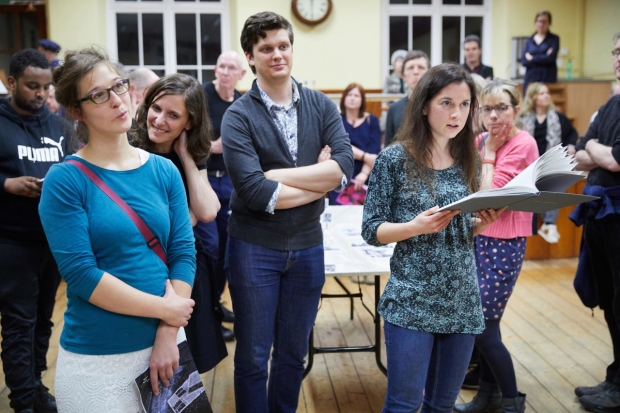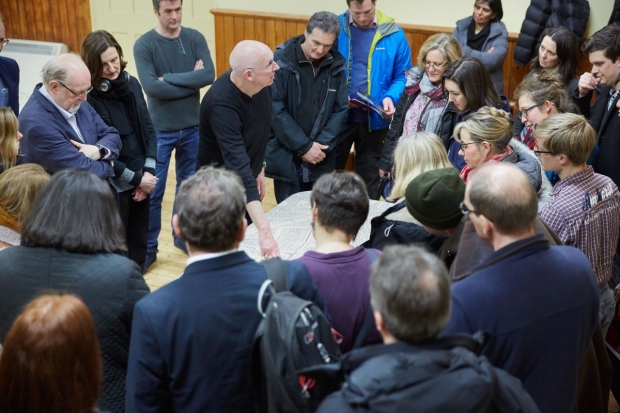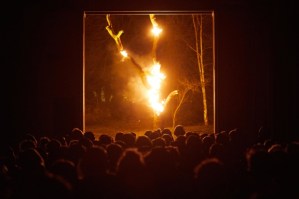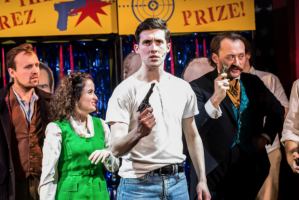Review: Storm Cycle II: Things Come Apart (Tabernacle Church, Cardiff)
Matt Trueman reviews the second in the cycle of National Theatre of Wales’ six productions which explore truth and testimony

© Photo by Mark Douet
On the 13 June 1919, Cardiff erupted. For four hot summer days, a race riot ripped through Butetown, a neighbourhood of immigrants near the city’s docks. There’s a John Lewis where Bute Street meets Hayes Bridge Road today, a line of chain restaurants and glass-fronted shops. A century ago, mobs of up to 2000 men fought running battles in the same streets. Houses burned down. Gunshots rang out. Three people died.
If the Storm Cycle opened with myths, it follows up with plain facts. In a Cardiff church hall, just around the corner, Mike Pearson and Mike Brookes piece together a blow-by-blow account of the violence that tore through the town that summer. Using newspaper reports from the time, read aloud by three actors, they’ve stitched together a detailed timeline of events. It reads like rolling news; like a Twitter feed trying to keep up; sometimes like sports commentary. The past feels at once immediate and absent.
The city is spread out over five tabletops, each printed with a portion of an old map, and Brookes and Pearson track the various battles as if playing a board game. Red dots mark flashpoints, black and white photos add colour: a ransacked shop, a police line, firemen at work. They move rioters' mugshots around like counters: thuggish white youths in uniform crowd in on middle-aged men of colour. It’s oddly tense. In the background, a pianist plays quaint old war songs; a reminder that this is art as well as history; a warning against nostalgia.

© Photo by Mark Douet
There’s a clear contemporary resonance to the Butetown riot. Racial tensions bubble up out of huge social change in the wake of the First World War. Cardiff attracted settlers from all over the empire and, with wages hit by war, a handful of xenophobes set out to start something. The sense, though, is of escalation and retaliation; two sides hardening into opposing mobs. Reason evaporates, passions enflame.
For all you get the gist, the story becomes a swirl of specifics. We’re not meant to keep up with every detail – Ali Goolyad, Aisling Groves-McKeown and John Rowley speak over one another and whisper asides – but for all it conveys the confusion and chaos of the unfolding riot, the story itself starts to feel shapeless.
It is. Riots are, and Pearson and Brookes serve their research straight, asking us to question the way events were reported. Extant language – Butetown’s dubbed n*****town – draws attention to media bias, and you clock the police behaving with remarkable restraint. Gory details stick in our minds – axes dripping blood, table legs to the head – yet there’s no effort to examine the underlying social causes; still less to suggest solutions. Brookes and Pearson can only speculate on its start: perhaps the weather, perhaps the war.
Over 90 minutes, however, it all becomes rather flat – more broken windows, another mob beating – as if violence slowly settles into a routine, tit-for-tat, and the tabletop form never fully unfurls into theatricality. Whether the riot’s escalating or wearing itself out, one’s never quite sure. All things fall apart, it seems. Storms gather and pass.
Storm Cycle II: Things Fall Apart runs at the Tabernacle Church, Cardiff until 24 March.

















